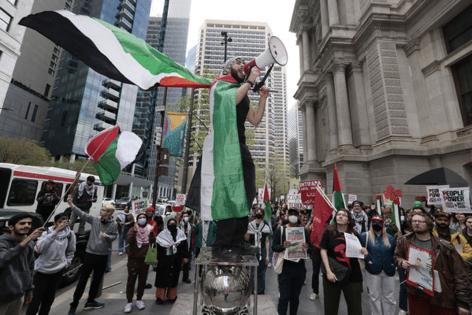2 arrests made, encampments taken down at Princeton following pro-Palestinian protests on college campus
Published in News & Features
Princeton University is the latest local university to see pro-Palestinian student protesters erect tents on campus as a national movement grips the nation and catalyzes debate over the war in Gaza, free speech on college campuses and American support for Israel.
Calling it a “Gaza Solidarity encampment,” the group said in a news release that tents were set up about 7 a.m. Thursday at McCosh Courtyard on the Ivy League University’s campus.
“The students of Princeton University are rising up alongside campuses across the country to show university leadership and trustees to demand no rest until divest,” the group said.
But Princeton, in a statement, said the tents are already gone, taken down voluntarily by protesters after warnings from the university’s Department of Public Safety. Two graduate students were arrested for trespassing, the university said.
The move comes as students opposed to Israeli military actions in Gaza and American support for Israel stagecampus protests at campuses across the nation, with arrests mounting. Encampments were up on at least 30 campuses nationwide as of Wednesday, according to The Chronicle of Higher Education, which is tracking the movement.
Meanwhile, more than 100 protesters gathered at City Hall around 2 p.m. as part of a student-led demonstration against the war in Gaza.The crowd plans to march a two-mile route through Center City and likely head toward University City, where other actions are planned this afternoon around the campus hub.
The rally took to the streets around 2:40 p.m., with people shaking noise-makers and chanting alternately between English and Arabic. In what’s now become a chorus at pro-Palestinian rallies, the crowd focused its message against President Joe Biden and called on leaders to end the Israeli military campaign in Gaza.
”Gaza Gaza don’t you cry, we will never let you die!”
Gov. Josh Shapiro in Washington, D.C. on Wednesday, seemed poised to step into the spotlight again if protests become disruptive on Pennsylvania campuses. And potentially with force.
“If the universities in accordance with their policies can’t guarantee the safety and security and well-being of the students, then I think it is incumbent upon a local mayor or local governor or local town councilor, whoever is the local leadership there, to step in and enforce the law,” Shapiro told Politico.
Shapiro was a key voice in the bipartisan criticism of former Penn president Liz Magill’s testimony on antisemitism before a congressional committee in December that ultimately led to her resignation.
At Princeton, activities started early Thursday morning when fewer than 100 people gathered on campus and some in the group began setting up about a half-dozen tents, which the university said is a violation of university policy.
“After repeated warnings from the Department of Public Safety to cease the activity and leave the area, two graduate students were arrested for trespassing,” the university said in a statement. “All tents were then voluntarily taken down by protestors.”
The two graduate students were barred from campus, pending a disciplinary process, the university said.
But other students and faculty members remained gathered on a campus lawn, continuing to protest Israel’s ongoing military operations in Gaza. Tensions rose, and at one point someone who appeared to be associated with the Ivy League university led a Pulitzer-prize winning Middle East correspondent away from the megaphone.
Students shouted “shame” and “let him speak” as Chris Hedges, formerly of the New York Times, was removed, an incident adding to the charged environment that saw over 200 students chanting “from the river to the sea” and other Pro-Palestinian slogans.
Urbi, a doctoral student from India who did not share her last name over concerns about her U.S. visa, said Hedges was removed from campus because of a ban on amplified sound. During earlier portions of the protest, students sat silently as speakers shouted — without a megaphone — messages of support for Palestinians and criticisms of Israel.
The student called Princeton’s response “deeply frustrating.”
The protest also drew a small gathering of pro-Israel supporters and those who said they supported the university’s containment of the encampment.
Riva Levy, 60, stood with a group of around 10 other supporters, one who yelled out at pro-Palestinian protesters that the word intifada was a threat to Jews.
“Nothing is going to change in the Middle East until the hostages are free,” said Levy, holding a sign depicting some of estimated 250 hostages taken on Oct. 7.
At Swarthmore College students set up tents on Monday evening, with as many as 200 protesters participating, according to one student organizer. At the University of Pennsylvania and other local campuses, no protests or activity was reported as of Thursday morning.
But at Penn, campus officials were getting ready for a “listening session” scheduled for faculty, students and staff at 4 p.m. Only people with Penn IDs will be admitted, the university has said. The school is facing mounting criticism for suspending the pro-Palestinian student group Penn Against the Occupation from campus.
Penn’s chapter of the American Association of University Professors in a statement this week condemned “the capricious and one-sided suppression of dissent at Penn this year, most recently seen in the unjustified ban” of the student group.
The Daily Pennsylvanian, the student newspaper, reported that more than 40 Penn and Philadelphia organizations had signed a letter to Philadelphia universities in support of the student group.
The university told the newspaper that the group “failed to comply with policies that govern student organizations at Penn, despite repeated efforts to engage with the group and to provide opportunities to resolve noncompliance.”
_____
(Staff writers Jesse Bunch, Max Marin and Gillian McGoldrick contributed to this article.)
_____
©2024 The Philadelphia Inquirer. Visit inquirer.com. Distributed by Tribune Content Agency, LLC.







Comments